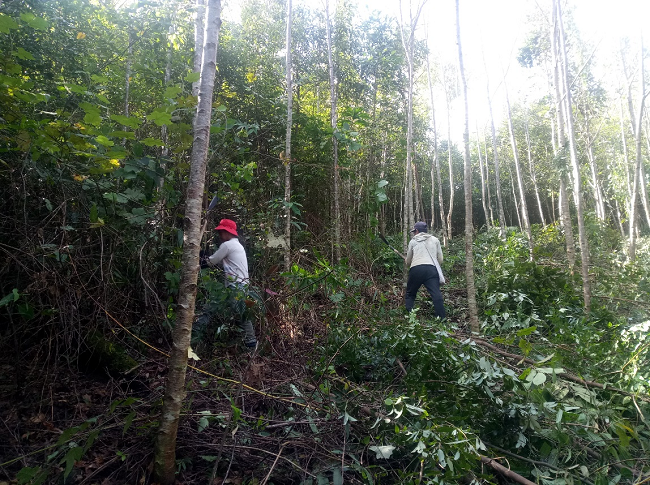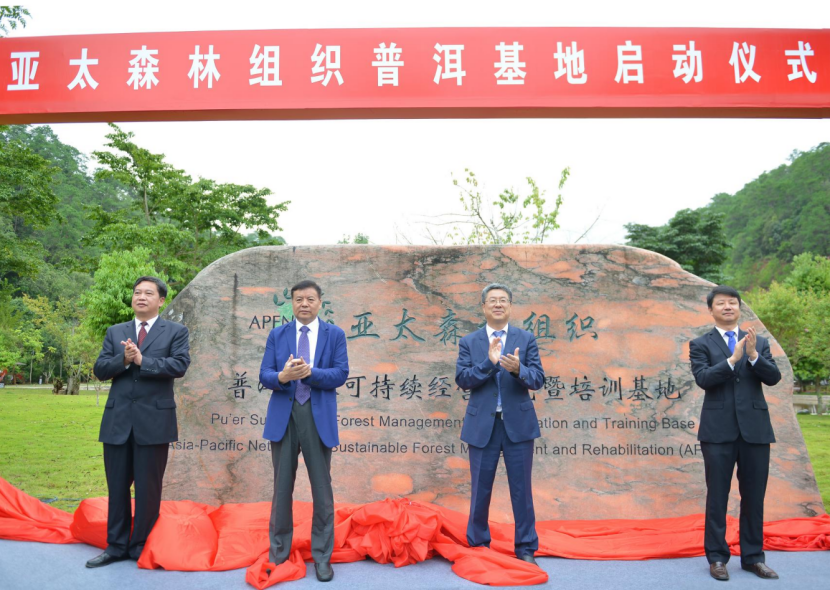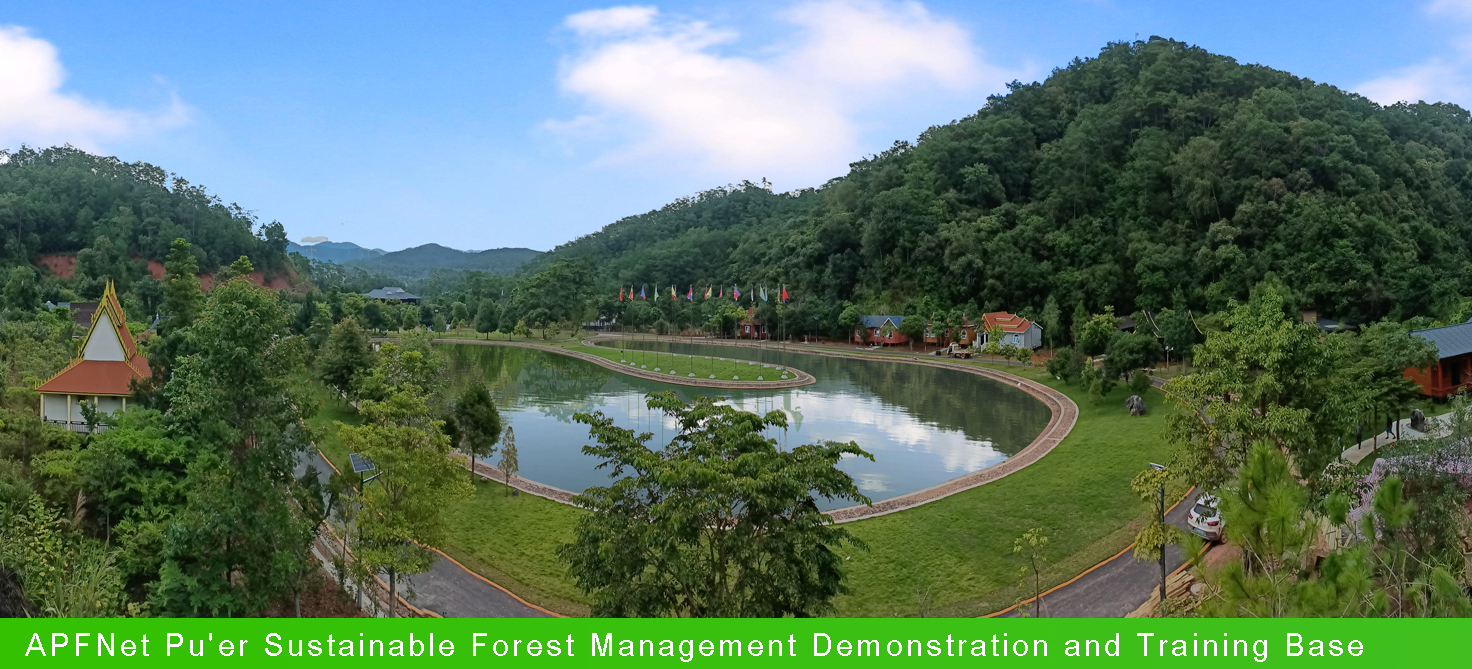Demonstration of Sustainable Forest Management and Establishment of the APFNet Tarining Base
Project title: Demonstration of Sustainable Forest Management and Establishment of the APFNet Training Base [2020P1-PE]
Supervisory agency: Forestry and Grassland Bureau of Pu’er City
Executing agency: Wanzhangshan Forest Farm
Budget in USD (total / APFNet grant): 5,088,510 /3,771,897
Duration: 36 months 01/2020-12/2022
Target economy: China
Site Location: Wanzhangshan Forest Farm, Pu’er City, Yunnan Province, China
Project goal: The project aims to establish the APFNet Pu’er Sustainable Forest Management Demonstration and Training Base at Wanzhangshan Forest Farm in Pu’er, Yunnan Province, China. Pu’er Base will focus on demonstrating best practices of sustainable forest management in tropical and subtropical areas through establishing 1,333 ha of demonstration area, and the Base will also offer opportunities to conduct scientific research related to forests and forestry, forestry training, environmental education and provide a platform for information exchange and policy dialogue to promote sustainable forest management in the Greater Mekong Subregion and other regions in Asia-Pacific.
Objectives:
- Promote sustainable forest management through establishing 1,333 ha of demonstration sites to showcase more best practices of managing commercial forest and ecological forest.
- Establish the APFNet Pu’er Sustainable Forest Management Demonstration and Training Base to serve as a regional platform for forestry information sharing, training, researching and policy dialogue.
- Disseminate sustainable forest management and conduct capacity building activities in the GMS region and Asia-Pacific.
Expected outputs:
1: Establishment of 1333 ha sustainable forest management demonstration area.
2: Construction of the service center, including the Yunnan House, Pu’er House and an exhibition room.
3: Construction of the APFNet Training Center, consisting of one meeting room, and the Asia-Pacific Ecolodges in the building style of traditional houses of 20 APFNet member economies.
4: Construction of the Yunnan Folk Village.
5: Establishment of the camping grounds.
6: Construction of the Eco-culture Lodges.
Introduction
The Lancang-Mekong River flows through China, Myanmar, Vietnam, Thailand, Cambodia and Lao PDR, and the forest ecosystem of the watersheds created through the Lancang-Mekong river is the ecological backbone for economic and social development in the Greater Mekong Sub-region (GMS). The GMS is one of the world’s most important biodiversity areas, home to an incredibly diverse range of ecosystems. All the GMS economies are increasing their efforts to ensure environmental sustainability and to develop green growth pathways. Approximately 60 million people live in the Lower Mekong Basin, with many relying on forests to sustain their livelihoods. However, the river basin faces significant deforestation and forest degradation threats.
To improve the management of forest ecosystems in the GMS region, starting from 2016, APFNet has funded a series projects titled ‘Integrated Forest Ecosystem Management Planning and Demonstration Project in the Greater Mekong Subregion’ in most of the GMS economies. Since Pu’er City is located at the lower Mekong basin, which is also a transition zone from north tropical to south sub-tropical ecosystems, APFNet selected Pu’er as one of the demonstration sites for the aforementioned project to showcase best practices of sustainable forest management in tropical and sub-tropical areas. To further promote best practices of forest management for GMS region and also establish a platform for forestry information sharing and capacity building, APFNet started a new project titled ‘Demonstration of Sustainable Forest Management and Establishment of the APFNet Training Base’ in 2020. The project aims to establish the APFNet Pu’er Sustainable Forest Management Demonstration and Training Base at Wanzhangshan forest farm in Pu’er, Yunnan Province. Pu’er Base will focus on demonstrating best practices of sustainable forest management in tropical and subtropical areas through offering opportunities to conduct scientific research related to forests and forestry, forestry training, environmental education and a platform for information exchange and policy dialogue to promote sustainable forest management in the Greater Mekong Subregion and other regions in Asia-Pacific.
Showcasing Forest Management Models for the GMS Region
The project is implemented at and by Wanzhangshan Forest Farm, which is a state-owned forest farm that manages its forests as an enterprise after its establishment in 2001. The farm is currently managing around 19,120 ha of forest land, including 7,993 ha of ecological forests,9,407 ha of commercial forest, 1,720 ha of other forest Although the area is bestowed with rich forest resources with forest cover reaches 80.85%, the quality of the forests is relatively low and forests in the project area are dominated by a few tree species, such as Simao Pine (Pinus kesiya) and Birch (Betula alnoides), which provide only limited ecosystem services.

Tending in young Betula alnoides plantation (Photo: Li Xianze)
In order to restore the forests to their full potential, it is necessary to implement effective forest management programs that integrate different forest management models in order to promote multiple ecosystem services and can play a demonstration role in the region. Based on the experiences from previous APFNet project at Wanzhangshan, 1333 ha demonstration plots for sustainable forest management will be established. The project will use different approaches for managing the commercial plantations and ecological forests. The commercial plantations will be intensively managed through optimized thinning and harvesting which will increase the growth rates and yields of target trees, so that the annual growth of stocking volumes got increased and land productivity and profitability could be both improved. For the ecological forests, holding and improving their ecosystem service functions will be the managing target, efficient approach such as selective cutting together with enrichment planting will be adopted to restore the forests to their original status. Close-to-nature Forest Management and multiple use forestry approaches will also be introduced to the farm to transform the mono-culture plantations into mixed species forests.
Establishment of the APFNet Pu’er Sustainable Forest Management Demonstration and Training Base
The Pu’er Training Base is one key output from the Strategic Cooperation Framework Agreement between APFNet, Yunnan Forestry and Grassland Administration, and Southwest Forestry University. It is the second of its kind for APFNet, the first one which called APFNet Multifunctional Forest Management Demonstration and Experience Base is located at Wangyedian Forest Farm in Inner Mongolia and has been put into operation since 2019. However, as that base is located in Inner Mongolia, the ecosystems it is representing ranged from temperate to boreal forests, thus only providing direct reference for a subset of the APFNet partners. Pu’er Base will focus on tropical and sub-tropical areas, and showcase best forest management practices towards GMS and similar climate regions. The base will serve as a platform for forestry information sharing and policy dialogue offer opportunities to conduct scientific research related to forests and forestry, forestry training and natural education.

Design of the Pu’er Base (L) and aerial photo of the Base after completion (R)
All the construction works were carried out during May 2020 to June 2021, and the launch ceremony was held on July 27, 2021. The base received ample endorsement during the launch ceremony, Mr. Zhao Shucong, the Chair of the APFNet Board, described the new base as "an important platform for promoting forestry cooperation in the Asia-Pacific region, especially the GMS region", while Mr. Peng Youdong, the former deputy administrator of National Forestry and Grassland Administration, China praised the contributions of the base would make to China's goal of creating an ecological civilization. The Base now can provide accommodations for around 140 people, and it also has two meeting rooms for organizing conferences and meetings with carrying capacity of 150 people. For people who want to experience the nature, the base provide a forest experience and natural education area which has two forest trails (one is 3km and the other is 5km) for visitors to enjoy the forests, picking mushrooms, watching birds and conducting natural education activities.

The official opening ceremony of the APFNet Pu’er Sustainable Forest Management Demonstration and Training Base (Photo: Liu Chengye)
To reduce the fire risks in Wanzhangshan farm, especially the Base area, a forest fire monitoring and early-warning system has been installed in the Base during 2020 – 2021, with four forest fire monitoring towers and two control centers were constructed. The system will not only detect fires automatically early, but also more efficiently fight them by providing suggested routes for fire-fighting groups to access the fire locations as efficiently as possible.



